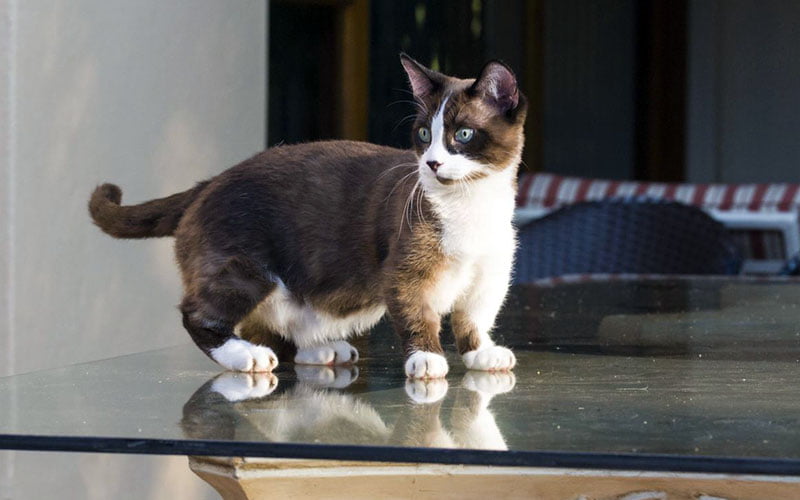
Are you looking for a feline companion that will capture your heart with its unique appearance and playful personality? Look no further than the munchkin cat! These adorable little creatures have captured the attention of cat lovers around the world with their short legs and charming disposition. In this comprehensive guide, we will delve into the world of munchkin cats, exploring their history, characteristics, care requirements, and more. So, let’s embark on a delightful journey into the enchanting realm of the munchkin cat!
The munchkin cat is a breed that is easily recognized by its distinctively short legs. Despite their diminutive stature, these cats possess a confident and lively demeanor that perfectly complements their adorable appearance. Munchkin cats come in various coat colors and patterns, further adding to their appeal. Whether you prefer a solid-colored munchkin or one with striking markings, you are sure to find a munchkin cat that steals your heart.
The fascinating history of the munchkin cat dates back to the early 1990s. The breed first captured the attention of cat enthusiasts when a naturally occurring mutation resulted in the birth of a kitten with unusually short legs. This unique characteristic caught the interest of breeders, who selectively bred these cats to establish the munchkin breed. Despite some initial controversy surrounding their breeding, munchkin cats have gained recognition and acceptance from cat organizations worldwide.
The most distinctive feature of the munchkin cat is, without a doubt, its short legs. These cats have a naturally occurring genetic mutation that affects the length of their leg bones, resulting in their adorable, low-slung stance. However, it’s important to note that munchkin cats are otherwise built proportionately and are not hindered by their leg length. Their compact bodies and long spines allow them to move and jump with ease, making them agile and playful companions.
Munchkin cats display a wide range of coat colors and patterns, making them a visually captivating breed. From solid colors like black, white, and cream to striking tabby patterns, tortoiseshells, and calico combinations, there is a munchkin cat to suit every aesthetic preference. Their beautiful coats are often soft and silky, inviting endless cuddles and strokes.
Munchkin cats are known for their playful and sociable personalities. These feline companions thrive on interaction and enjoy engaging in interactive play sessions with their human counterparts. Their curious nature and outgoing disposition make them excellent family pets and companions for individuals of all ages. Be prepared for hours of entertainment as you witness their acrobatic antics and mischievous playfulness.
Munchkin cats are generally healthy and robust, with no specific breed-related health issues. However, it is always essential to provide them with regular veterinary care, including vaccinations, deworming, and preventive treatments for fleas and ticks. With proper care and a balanced diet, munchkin cats can live long and fulfilling lives, typically spanning 12 to 15 years or even longer.
Maintaining a healthy diet is crucial for the overall well-being of your munchkin cat. It is recommended to feed them a high-quality, commercially available cat food that meets their nutritional needs. Consult with your veterinarian to determine the appropriate portion sizes and feeding schedule based on your cat’s age, weight, and activity level. Remember to provide fresh water at all times and avoid feeding your munchkin cat excessive treats or human food, as it may lead to weight gain and other health issues.
Munchkin cats have a moderate-length coat that requires regular grooming to keep it in top condition. Brush your cat’s fur at least once a week to remove loose hair and prevent matting. Additionally, pay attention to their dental health by brushing their teeth regularly and providing dental treats or toys to promote oral hygiene. Trim your cat’s nails as needed and clean their ears using a veterinarian-recommended solution to prevent infections.
As energetic and playful cats, munchkins thrive on regular exercise and mental stimulation. Engage your munchkin cat in interactive play sessions using toys that encourage them to chase, jump, and pounce. Provide scratching posts or cat trees to satisfy their natural urge to scratch and climb. Consider setting up a safe and enriching indoor environment with perches, tunnels, and hiding spots to keep them entertained and engaged.
Proper litter box training is essential for your munchkin cat’s hygiene and comfort. Ensure that you provide a clean and easily accessible litter box in a quiet and secluded area of your home. Use a litter type that your cat prefers and scoop the box daily to maintain cleanliness. If you have multiple cats, provide one litter box per cat plus an extra box to prevent territorial issues and promote good litter box habits.
A: Absolutely! Munchkin cats are not hindered by their short legs. Their unique leg structure does not cause any physical limitations or health issues. These cats are agile, playful, and can lead a perfectly normal and active life.
A: Yes, munchkin cats can be great companions for families with children. They are known for their sociable nature and love interacting with people of all ages. However, it is important to teach children how to handle and interact with cats gently and respectfully to ensure the well-being of both the cat and the child.
A: Munchkin cats do not require any special care beyond what is needed for any other cat breed. However, it is crucial to provide them with a balanced diet, regular exercise, and veterinary care to ensure their overall health and well-being.
A: Like any other cat breed, munchkin cats can be prone to obesity if not provided with a balanced diet and regular exercise. It’s important to monitor their weight and adjust their diet accordingly to maintain a healthy body condition.
A: Yes, munchkin cats are intelligent and can be trained using positive reinforcement techniques. They can learn to respond to commands, use a scratching post, or even perform tricks with patience, consistency, and rewards.
A: Yes, munchkin cats are recognized by various major cat organizations, including The International Cat Association (TICA) and the Cat Fanciers’ Association (CFA). They have gained acceptance and are eligible to participate in cat shows and competitions.
If you are seeking a feline companion that is both visually captivating and delightfully playful, the munchkin cat is an excellent choice. With their unique appearance, charming personalities, and adaptability, munchkin cats have won the hearts of many cat lovers worldwide. Remember to provide them with love, care, and a stimulating environment to ensure their well-being. So, why wait? Embark on a wonderful journey with a munchkin cat and experience the joy they bring to your life!
Recommended other topics: Speak with Animals 5e-Unlocking the Power of Communication










© InfoDoot. All Rights Reserved.